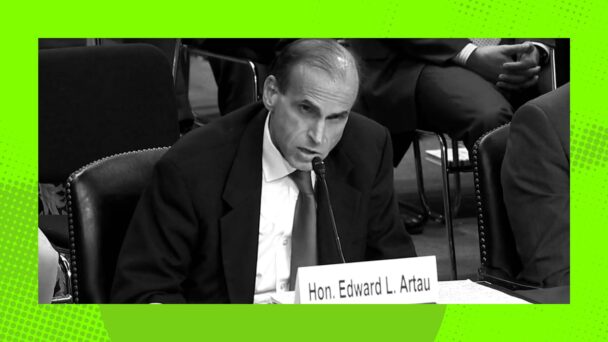Last Thursday was a banner day for the Senate Judiciary Committee, which is responsible for, among other things, kicking off the confirmation process for federal judicial nominees. To that end, the Committee advanced five nominees to the full Senate for a vote, including Sarah French Russell, a former public defender, and Mustafa Kasubhai, a former labor lawyer and forevermore inspiration to anyone who has ever written bad poetry.
Under normal circumstances, advancing nominees with public interest backgrounds would be enough to make Republican senators, who prefer the carbon copy corporate attorneys and prosecutors who usually sit on the federal bench, very upset. However, the Committee used its executive business meeting to authorize subpoenas of conservative financiers and/or Thomas family vacation subsidizers Leonard Leo and Harlan Crow, as part of an ongoing probe into Supreme Court ethics (or lack thereof). As a result, Republicans spent much of the afternoon furious about alleged procedural irregularities, engaging in the sort of histrionics they otherwise reserve for defending the honor of Republican Supreme Court nominees credibly accused of sexual assault.
Of particular concern was Chairman Dick Durbin’s announcement that the Committee would move directly to a vote on Kasubhai and Eumi Lee, a California district court nominee, rather than open the floor for debate. Kasubhai and Lee had already been debated at length at earlier hearings—two of them, in fact—but Republicans were nonetheless outraged that they couldn’t accuse the nominees of being closet Marxists one last time.
“You want us to shut up? Is that what you’re saying?” asked Senator Marsha Blackburn of Tennessee. When Arkansas Senator Tom Cotton’s name was called for his vote, he responded, for some reason, in the third person. “Mr. Cotton says the chairman needs to rethink his decision and let Senator Cornyn and Senator Blackburn speak. That’s what Mr. Cotton says, so you can mark that down as my vote.” (It is not clear where this fits into the traditional yea-nay-present framework.) Cotton also questioned Durbin’s feminist bona fides for not permitting Blackburn to give an encore performance. “Senator Durbin isn’t gonna allow women to speak,” he said. “I thought that was sacrosanct in your party.” (The implication here is that in the Republican Party, allowing women to speak is optional.)
As Durbin noted, moving nominations to the full Senate in this manner has a very recent precedent: When they chaired the Committee, both Senators Lindsey Graham and Chuck Grassley forged ahead with votes without allowing Democrats—then in the minority—to weigh in. Republican senators tasting their own medicine were outraged to discover how nasty it is. “You’re saying because you think Senator Grassley violated the rule, you’re going to violate the rule?” Senator John Kennedy asked Durbin, who appeared genuinely bewildered by the question’s premise. “It’s called precedent,” Durbin said.
Later in the proceedings, Republicans took issue with the Committee’s ongoing ethics investigation, which they unsuccessfully sought to delay by offering a whopping 177 amendments. Graham described the subpoenas of Crow and Leo as part of a “jihad” against the Roberts Court and a plot to “destroy Clarence Thomas’s reputation”—an insult to Thomas, who is more than capable of destroying his reputation on his own.
After the meeting had concluded, Senators Ted Cruz and Mike Lee argued that the subpoenas, which Democrats approved unanimously after Republicans walked out of the room, weren’t technically valid, since the vote took place a few minutes after the hearing’s scheduled conclusion. As the old saying goes, if the law is not on your side, argue the facts; if the facts are not on your side, argue the law; if neither the law nor the facts are on your side, whine to reporters and gesture dramatically at your watch.
Senate Judiciary Committee voted 11-0 to approve subpoenas of Harlan Crow and Leonard Leo but Sens. Ted Cruz and Mike Lee say they are invalid because they were approved without a quorum present and because vote was concluded after noon — and Republicans had invoked 2-hr rule.
— Alex Bolton (@alexanderbolton) November 30, 2023
Throughout the meeting, Republicans demonstrated a comical lack of self-awareness. They were shocked by Senate Democrats’ decision to apply the same rules Senate Republicans created, and furious about the issuance of subpoenas they had no power to stop. Texas Senator John Cornyn accused Durbin of “destroying the United States Judiciary Committee,” which is a pretty dramatic eulogy for a body scheduled to meet again later this week.
Clip via YouTube
As Durbin noted afterwards, these performances were merely a bid to shield conservative power brokers from congressional scrutiny by any means necessary. “This Committee cannot sit idly by and ignore our constitutional duty to conduct oversight over the judiciary when the American people’s confidence in the Supreme Court has fallen to record lows,” Durbin said. “The information [Leo and Crow] hold is critical to understanding how individuals and groups with business before the Court gain private access to the justices.”
Public demands for Supreme Court oversight and accountability have reached a fever pitch in recent months, following relentless reporting of the justices’ persistent bad behavior. If Roberts and his colleagues are not going to cooperate in the process of cleaning up their ethical messes, exercising Congress’s subpoena power is an undeniable step in the right direction.




